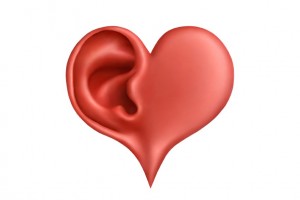“Without mindful listening it is simply not possible to extract what is important from what is said and to make the kind of connections that are needed for innovation.”
Cristina Bianchi / Maureen Steele writing in Coaching for Innovation
What is mindful listening?
The ability to be a keen observer of even the smallest details is an important skill that innovators have in common. Thanks to this skill, innovators are able to pick up on more and make better connections. It is this ability to think associatively that leads to insights about new ways of doing things. Developing your powers of observation and the ability to listen at a very high level – listening mindfully – will enable you to make better connections based on what you are hearing, seeing and sensing.
Hearing is a physiological process. It is largely passive and happens automatically although thankfully, you can sometimes choose to filter out those things you don’t want to hear and ignore them.
Listening comes about as a result of a choice to pay attention, and is largely active. Listening actively means you place yourself at the service of the speaker and provide feedback on what you hear by restating, paraphrasing, and summarising.
Listening mindfully implies that you activate your observational skills to the maximum and all of your senses, not just hearing, are receptive to what is going on around you.
When you listen mindfully:
- You are fully present in the dialogue with all this entails, mind, body and soul and yet you retain the objective ability to observe the discussion from different angles.
- You clear your mind of any unrelated matter, your preconceptions and judgements whilst retaining your critical thinking ability and keeping sight of your intention and purpose.
- You listen to both what is being said and how it is being said, making an effort to understand the interest and intent of the speaker and their perspective.
- You demonstrate that you have not only heard but understood by reflecting back and summarising what the other has said.
- You are not only a sounding board and a channel but also a catalyst who actively seeks to ask questions and make challenges in order to move the dialogue forward.
- You balance your input and contribution with appropriate use of silence to give the speaker whatever space is needed to think.
- You pay keen attention and observe all the signals that are available to get clues about how to make your question and input relevant, timely and well formulated.
- You are aware of the effects of your non–verbal communication on the other person and understand the impact it has on the direction and tone of the dialogue.
- You are clear about what you want to achieve at all stages of the discussion and you consciously align your non–verbal communication with your purpose.
Follow the 7-Day Programme for Mindful Listening in Chapter 5 of:
Coaching for Innovation
By Cristina Bianchi / Maureen Steele
Palgrave Macmillan, 2014

